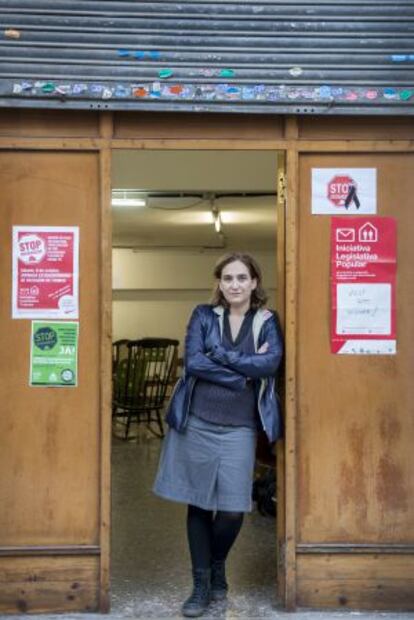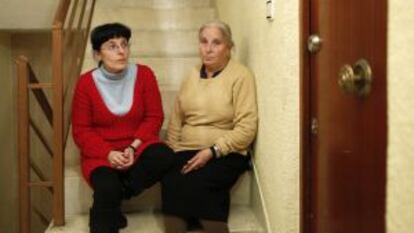A sense of justice
Spanish judges are pressing for the law allowing evictions for mortgage default to be scrapped They are taking their case before the European Court of Human Rights

Over the last two years, Spanish judges have issued some 350,000 foreclosure orders, resulting in the eviction of tens of thousands of families throughout the country unable to meet their mortgage repayments from their homes. Aware of the public's anger against the country's banks - and perceptions that the evictions are being carried out based on legislation dating back to 1909 that allows banks to pursue mortgage defaulters for their debt even after they have returned a property - in mid-October the General Council of the Judiciary (CGPJ), the body that oversees the country's legal system, was presented with a report put together by a team of seven judges that was highly critical of the use of the law allowing banks to repossess properties.
The issue has been further highlighted by two suicides over the last month of a man and a woman whose homes were about to be repossessed, tragedies that prompted the government to call on banks to halt evictions for the next two years in cases of "extreme hardship."
"More and more judges are now prepared to speak out about this issue. They are overcoming the mistaken belief that they should keep their opinions to themselves. The decision by some judges to speak out about this has to some extent brought us closer to the rest of a society that we have become distanced from," says Pedro Luis Viguer, the 47-year-old head of the Valencia region's bar association, and one of the magistrates who has been most vocal in his criticism of evictions. He remains unimpressed by the government's moratorium on foreclosures, believing it doesn't go far enough.
Viguer's report to the CGPJ accuses the banks of being "irresponsible, of bad practice, and of not taking the situation seriously." He and others, such as Manuel Almenar, one of the authors of the judges' report, want foreclosures and evictions to be halted and mortgages renegotiated in cases where borrowers are either unemployed or have suffered an illness or accident that prevents them from working, and for the law to be changed to allow for debts to be cancelled by dation in payment, sometimes known as a walkway mortgage, whereby the borrower simply returns the keys to a property.
Some judges speaking out has brought us closer to the rest of society"
The CGPJ has yet to comment on the report, and now appears to be backtracking over whether it even asked the judges involved to compile it. One of the seven judges who wrote it insists that he and his colleagues were asked by the CGPJ's board to report back to its board on evictions: "It's outrageous that after eight months work without any payment, they are now pretending to know nothing about this," he said on condition of anonymity.
Leaving the CGPJ's lukewarm response aside, events have largely overtaken it. Shortly after the report was leaked by EL PAÍS, the 47 heads of the country's regional and provincial bar associations issued a statement in which they noted: "The judicial system is called on to lead a public debate about how to combat the crisis." A commission of 15 judges added in the statement that the law regarding mortgage defaults needs to be changed.
In recent years a small number of judges around the country have issued sentences denying the banks' right to repossess properties and to claim borrowers' future earnings, referring to "unjust enrichment," "abuse of the law," and practices tantamount to "usury."
At the same time, the Platform for those Affected by Mortgage (PAH) and the housing-rights groups of the 15-M protest assemblies have used direct action to prevent nearly 500 evictions, while raising awareness of the issue in the media.
A 15-strong panel said the law on mortgage defaults needs to be changed
Ada Colau, a 38-year-old civil rights activist, is one of the founders of the PAH. "We have achieved some small, but important victories, by getting banks to sometimes agree to take a property back rather than auctioning it off and evicting the occupants, or by not pursuing borrowers for money once a property has been auctioned. We have the support of hundreds of town halls around the country who want the law changed."
PAH has gathered some 600,000 signatures in support of a motion it has presented before Congress calling for retroactive dation in payment legislation to be introduced. Martí Batllori, a lawyer who works for PAH, says that most deputies, regardless of their party, are against the move, but that the group will continue campaigning, and intends to gather one million signatures.
Pablo Matos, the Popular Party's housing spokesman when it was in opposition, says dation in payment is "lunacy: the only thing it achieves is the loss of the property and the family having nowhere to live." He argues that the government's moratorium is an "urgent" response to bring evictions to a halt, and says that he wants to see the mortgage law changed. "I can assure you that we will press on with this. There have been a great many abuses and disproportionate use of the law."
But the PAH says a moratorium on evictions is not enough. "Partial moratoria are not enough. For one thing, this only stops evictions; it does not address the issue of the debt. People have a right to be able to walk away from debt by handing over the keys to their property and moving to rented accommodation," says Ada Colau. The government has suspended mortgage payments by anyone earning less than 14,400 euros a year after taxes. It also gave legal force to a two-year eviction suspension already announced by the banks.
Some judges say they won't process orders until they hear from Europe"
But the new rules are full of caveats. To avoid eviction a household must have more than three children, children under the age of three, or elderly or disabled members. Single parents with two children and victims of domestic violence also qualify. But that leaves a large number of families at risk. It also leaves in place the law meaning evicted homeowners remain liable to pay off the outstanding debt after their property is sold - assuming it gets less than they paid for it.
"This measure would not affect foreclosures which are under way and so leaves out hundreds of thousands of families still swamped by proceedings. We demand an immediate halt to all foreclosures, as long as they affect first homes and debtors in good faith," a PAH statement says.
Guillem Soler, a 36-year-old judge in Barcelona, has been among the first magistrates to criticize the eviction law. Two-and-a-half years ago, when the issue had not been picked up by the media, he suggested during a hearing that the law was unconstitutional, but the Constitutional Court ruled against him. In Soler's view, people have no comeback from the law. "When somebody loses their home because they cannot pay the mortgage, they have no appeal rights; they cannot halt the eviction. If they want to do that, they have to undertake a completely different process. The law supports the bank carrying out the eviction."
Soler is also critical of the government's moratorium. "The nub of the problem is an unjust system that requires a change to the law. We need deep-rooted reform of the law." He puts forward two options: dation in payment, or changing the law so that the bank takes the property back at 80 percent of its value instead of the current 60 percent. "Any change to the law would have to be retroactive, given the number of evictions that have already been carried out."
We want judges to discuss the possibility of halting evictions"
Edmundo Rodríguez, a 49-year-old magistrate based in Álava in the Basque Country, has called for the current mortgage law to be scrapped, highlighting the situation of thousands of people unable to appeal against it, most of whom cannot afford a lawyer. "I would get rid of it. We have to install a law for all creditors. We need to provide debtors with the means to appeal against action against them, for example when contracts include abusive clauses such as high levels of interest when payment is delayed, as well as establishing that a property is a family home, and that a lawyer must always be assigned in the case of evictions. At the moment, in 95 percent of cases there is no opposition to the process. This means that judges approve the process, and the property is sold at auction for a dime."
A survey carried out by the PAH of 6,000 evictions showed that in 82 percent of cases there was at least one minor in the home, that 65 percent of those being evicted were Spanish, that more than 40 percent of mortgages were between 100,000 euros and 200,000 euros, and that 49 percent were unemployed. The now-nationalized Bankia was responsible for 16 percent of evictions, with BBVA second on 12 percent. "People in this situation are desperate, in most cases it had not occurred to them to hire a lawyer. When they come to court without a lawyer," says Rodríguez, "it is almost impossible to do anything to help them."
Rafael Mayoral, a 38-year-old Madrid-based lawyer, has represented dozens of families seeking to delay eviction orders. He says that he is impressed that the PAH has achieved so much in raising awareness over what he sees as an abuse of the law by the country's banks. "When people are issued with an eviction order, they aren't even told that they have the right to a lawyer, free of charge. "This means that people who face losing their home believe that they have no rights, because they have no idea about how the procedure works. What's more, the costs of the legal process will be passed on to them." He and around 100 other lawyers have teamed up to help families issued with eviction orders.
Meanwhile, the European Court of Human Rights (ECHR) will soon have a say in the issue after a Spanish judge took the case of Mohamed Aziz, a Moroccan resident in Catalonia facing eviction. The advocate general of the court, whose job is to offer legal advice to the judge, was highly critical of the current legislation, as well as of the government's proposed moratorium: "The moratorium in itself is dangerous if the debt is not removed. If it is simply paralyzed, all that happens is that the problem is delayed, because the interest continues to mount. If the debt is not reduced, there is no definitive solution. What's more, this is a measure that should be applied across the board, not simply to those in extreme hardship."
The ECHR will likely call for Spain's legislation on mortgage default to be overhauled or scrapped. Indeed, some judges have already said that evictions should be stopped immediately until a ruling is made, among them Ángel Dolado, a Zaragoza-based judge, and president of the Independent Judicial Forum. "To avoid further problems, all evictions should be stopped forthwith. We have put together a document outlining our proposals that has been sent to every court in Spain. We want judges to discuss the possibility of halting evictions." Mayoral says that this week will see formal requests by hundreds of people facing eviction orders requesting they be halted.
Diego Gutiérrez, a 37-year-old judge in Lleida is confident that until a ruling comes from Strasbourg, evictions will be halted in Spain. "We have to do something. The judiciary has already made it clear that we have to address this issue. Some of my colleagues are already saying that they will not process eviction orders until they hear from Strasbourg."
Other judges, such as Supreme Court Justice Juan Antonio Xiol are already looking into whether it is possible for the Spanish judicial system to quash the eviction legislation through a sentence issued by the Supreme Court. "It's not easy, but nor is it impossible. We have to find a way to channel an appeal against an eviction so that it makes its way up to the Supreme Court."
Meanwhile, organizations like the PAH will continue campaigning. The government's moratorium has brought the issue further into relief, prompting intense debate among legal experts. The slow-to-move, conservative CGPJ seems to have been caught on the back foot by events, and many of its more progressive members are determined to keep fighting. "The problem is not that the law is mistaken, but that it is always misapplied in favor of the same people," says one of their number.
Read the small print

Over the last 45 years, Apartment 1, 23 Doctor Barraquer street, in the Madrid dormitory town of Getafe has had four owners, among them a bank. Magdalena, the apartment's second owner, now rents a property in the floor above. Over the last 18 months she has struggled with debt, been through two evictions, and taken in her unemployed daughter.
Magdalena moved into Apartment 1 in 1976: "With my two young daughters; I was recently widowed." She bought the apartment from her friend Eugenia, who had just won the lottery. She had bought the property new in 1967, at a time when Getafe was growing fast and new properties being built.
"The apartment cost me 1.8 million pesetas, around 11,000 euros." She paid 800,000 up front, and the rest in installments of around 72 euros a month. "In seven years the place was paid off," she says proudly.
Until two years ago, Magdalena's was a quiet life. Her two children had grown up, found jobs, and left home. In 2007, when Spain's property bubble was reaching its most inflated point, her youngest daughter Isabel bought a small house in a development in Camarena, in Toledo, valued at 110,000 euros. Real estate company Épicas was the intermediary with the General Electric bank, which lent her the money. The bank valued the property at 218,249 euros, and Isabel signed a loan agreement for 90,000. The whole procedure was carried out very quickly, and Isabel was not required to provide proof of income: she had worked as a part-time waitress for two months, and her husband was a security guard earning a basic salary of 900 euros a month, plus overtime. The bank told the couple that their monthly mortgage repayments would be 400 euros, but that they would have to put up Isabel's mother's property as collateral. Later, they would learn that they owed the bank 111,000 euros.
The couple's problems began when Isabel lost her job in 2008. In 2009, the bank repossessed the property in Toledo. Isabel returned to live with her mother. "The hardest part was telling my mother that her home was now at risk of being taken by the bank as well," says Isabel.
Over the next year, Isabel says that she did everything she could to avoid her mother losing her home, making numerous court appearances, and managing to prevent her being evicted on three occasions. The bank wanted its loan of 111,000 euros, along with 12,000 euros interest, plus a further 36,000 euros in costs. Isabel and her mother were eventually evicted. A neighbor offered to rent them a room for 250 euros a month.
Isabel joined the Platform for those Affected by Mortgages (PAH). A short walk round Getafe illustrates the scale of the problem of evictions there over the last two years. "In our street alone there have been several," says Isabel pointing to a number of properties. There have been three in her building.
Two of them are empty, but Magdalena's old apartment is now occupied by a couple in their thirties with two small children. They had been living for the previous 11 years in rented accommodation, but saw the apartment advertised in a local estate agent for 75,000 euros, and managed to negotiate the price down to 55,000 euros from the bank. They have knocked down walls, turning it into a spacious, airy apartment.
The couple say that they didn't want to take out a mortgage with the bank, instead buying the property outright with the help of their family. "We had no idea that the place had been repossessed until we signed the contract. That's when we learned that the owner was General Electric. We were very sorry when we heard about Magdalena's story. We have learned from it: we would never put our home up as collateral against a loan taken out by our children."
Tu suscripción se está usando en otro dispositivo
¿Quieres añadir otro usuario a tu suscripción?
Si continúas leyendo en este dispositivo, no se podrá leer en el otro.
FlechaTu suscripción se está usando en otro dispositivo y solo puedes acceder a EL PAÍS desde un dispositivo a la vez.
Si quieres compartir tu cuenta, cambia tu suscripción a la modalidad Premium, así podrás añadir otro usuario. Cada uno accederá con su propia cuenta de email, lo que os permitirá personalizar vuestra experiencia en EL PAÍS.
En el caso de no saber quién está usando tu cuenta, te recomendamos cambiar tu contraseña aquí.
Si decides continuar compartiendo tu cuenta, este mensaje se mostrará en tu dispositivo y en el de la otra persona que está usando tu cuenta de forma indefinida, afectando a tu experiencia de lectura. Puedes consultar aquí los términos y condiciones de la suscripción digital.









































